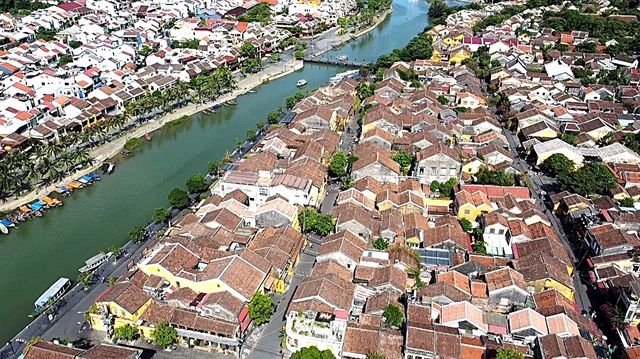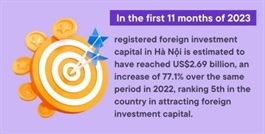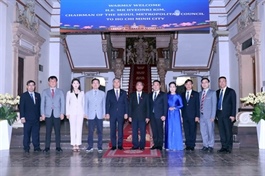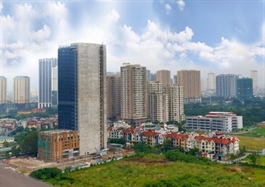Crisis grips hospitality businesses in Vietnam's ancient city of Hoi An
Crisis grips hospitality businesses in Vietnam's ancient city of Hoi An
The UNESCO-listed ancient city of Hoi An in Quang Nam Province, central Vietnam, which was once an extremely promising opportunity for the hospitality sector, has now found itself in the midst of a severe financial crisis.

The ancient city of Hoi An has spent the past few years grappling with a financial crisis in its hospitality sector. Photo: B.D. / Tuoi Tre |
Rising debts among business tycoons
Notably, several struggling hospitality businesses in Hoi An are owned by entrepreneurs whose net worth once soared into the billions of Vietnamese dong. Now, many of their assets are being held by financial institutions.
Compounding the crisis is the current downturn in the real estate market, making it exceptionally challenging for debt-laden enterprises to sell property in order to generate funds for debt repayment.
Some hotels, once valued at VND200-300 billion (US$8.2 - $12.3 million), are now proving impossible to sell, even after significant price reductions.
By the end of October, one particular enterprise which managed a luxury hotel chain in Hoi An had had its electricity cut due to delayed bill payment.
This is just one illustration of the current state of Hoi An’s hospitality sector.
According to the owner of a local accommodation chain, a major issue for such businesses is the fact that many of their rooms have either been sold or been used as collateral by banks to service outstanding debts.
“I have never experienced such challenging times before,” the owner shared.
"My hotels still receive guests, but the revenues aren’t enough to pay off our debt."
Rumors have even spread across the city that certain once-profitable businesses are looking to sell.
"Despite the difficulties [of selling] being true, if there are potential advantages in selling the hotels, we are open to considering it as a solution to address the current obstacles,” said one hospitality entrepreneur implicated in such rumors.
Hotels up for sale
The financial issues gripping Hoi An’s tourism industry is the result of several issues, including declining tourist arrivals due to the lingering effects of the COVID-19 pandemic.
The result has been decreasing revenues and unyielding costs, forcing many enterprises to begin selling off assets.
Currently, there are about 900 hospitality service providers in Hoi An offering a combined 13,000 rooms, inclusive of 408 homestays and 170 hotels.
In its heyday in 2019, the UNESCO-listed city welcomed almost seven million tourists, many of whom were foreign visitors.
Post-pandemic Hoi An has yet to see anywhere near that number of arrivals, with figures continuing to decline, leading to a reduction in room prices and increasing financial strain on businesses.
According to a report on Hoi An's tourism industry in the first nine months of 2023, approximately 3.1 million visitors visited the city and just 1.2 million stayed overnight.
While this is a year-on-year increase of more than 215 percent, enterprises in Hoi An generated a total revenue of just over VND2.5 billion ($105,407).
Challenging times in hospitality
Over the past few years, Hoi An has witnessed a wave of asset sell-offs as businesses attempt to withdraw capital from the hospitality sector.
This trend has affected both smaller enterprises, like villas or homestays, and well-established hotels.
In downtown Hoi An, numerous old houses, once rented at exorbitant prices, now remain closed due to an inability to find tenants.
Rent notice boards are ubiquitous and advertising rates half as much as before, yet the occupancy rates remain extremely low.
An official from Hoi An's authority acknowledged the remarkably challenging times faced by hospitality businesses in the city.
"The city, the province, and the tourism industry have been actively initiating various measures to support businesses; however, the current situation remains extremely challenging," stated the official.
"There is a significant number of enterprises compelled to liquidate assets or have their assets frozen by banks due to outstanding loans. The majority of these businesses operate in the hospitality services sector and own hotel or restaurant chains.”
Despite various initiatives from the city, the province, and the tourism industry to support businesses, the prevailing situation remains difficult.
In September, the Asset Exploitation and Debt Management Company Limited (Agribank AMC Ltd) conducted auctions for 11 houses in Minh An and Cam Pho Wards of Hoi An with a total starting price exceeding VND250 billion ($10.26 million).
These assets were mortgaged for bank loans between 2016 and 2018.
Additionally, VietinBank announced auctions for several properties, mostly 3-star or 4-star hotels, homestays, and villas in Hoi An, with starting prices ranging from hundreds of millions to hundreds of billions of Vietnamese dong.























